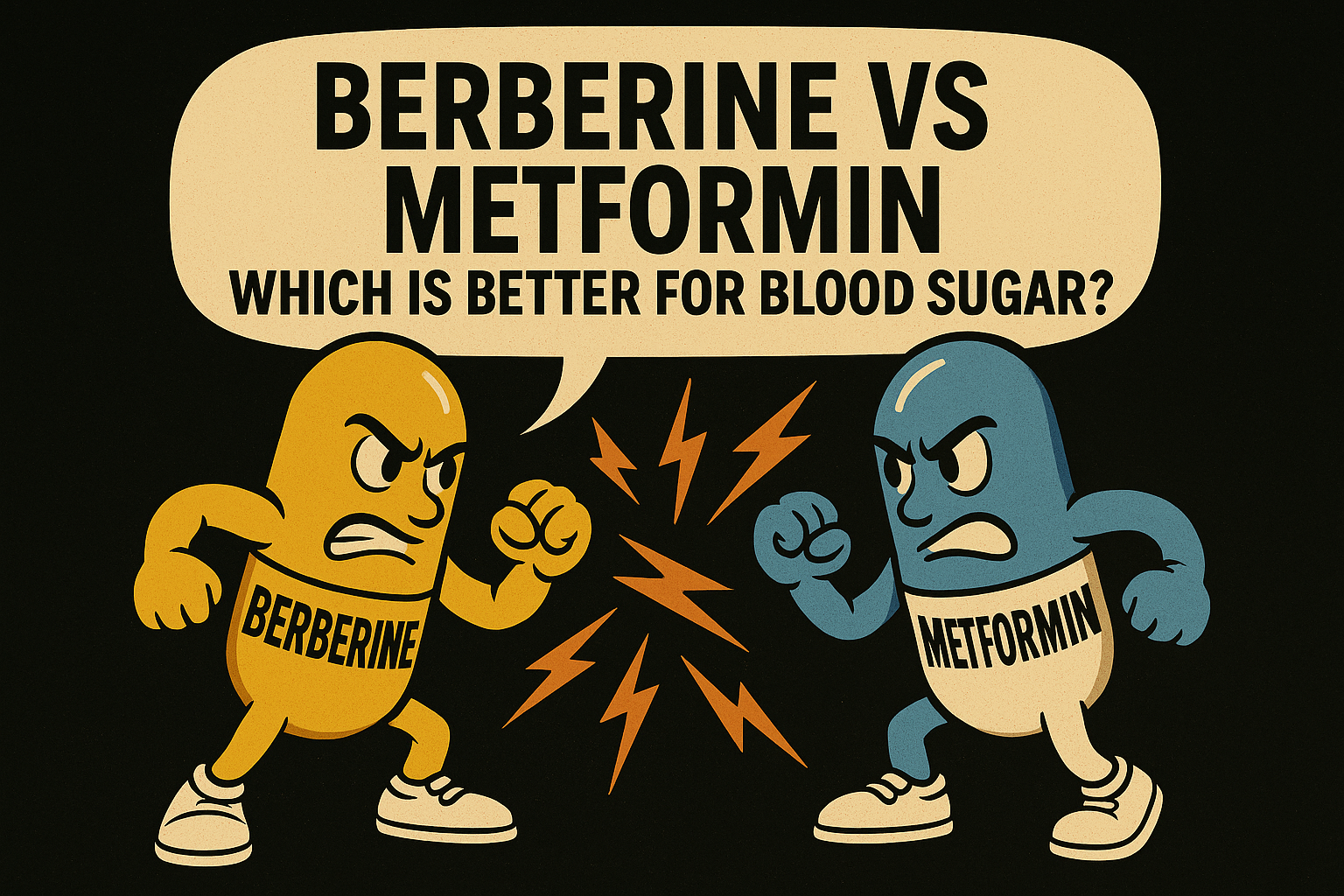Berberine vs Metformin is a growing topic of interest among people looking for natural ways to manage blood sugar. While one is a prescription drug and the other a plant-based compound, both have been shown to support metabolic health. But which one is better? Many are turning to the Berberine vs Metformin debate to weigh up safety, effectiveness, and long-term health outcomes.
So is Berberine really better than metformin? Let’s dig into the science, the benefits, the risks, and how they compare. This clear-eyed look at Berberine vs Metformin will help you decide which option makes the most sense for your body and lifestyle.
🔬 What Is Berberine?
Berberine is a natural plant alkaloid used for centuries in traditional Chinese medicine. In modern research, it’s gained attention for its ability to:
- Lower blood glucose
- Improve insulin sensitivity
- Reduce inflammation
- Support weight loss and cholesterol levels
It works by activating AMPK (AMP-activated protein kinase), often called the “metabolic master switch.” This is similar to the way metformin works, which is what makes the comparison so fascinating.
💊 What Is Metformin?
Metformin is a first-line prescription drug used for type 2 diabetes. It:
- Decreases glucose production in the liver
- Increases insulin sensitivity
- Has decades of research and clinical use
It’s effective and widely trusted—but not without side effects like digestive upset and, in some cases, long-term B12 depletion.
🔍 How Do Berberine and Metformin Compare?
Let’s break it down:
| Feature | Berberine | Metformin |
|---|---|---|
| Source | Natural plant extract | Pharmaceutical drug |
| Main Action | Activates AMPK, lowers glucose | Activates AMPK, lowers glucose |
| Research Backing | 100+ studies, incl. head-to-head trials | 60+ years of clinical use |
| Side Effects | Mild GI upset possible | GI upset, B12 deficiency risk |
| Prescription? | No | Yes (requires doctor) |
👉 2008 Study (Zhang et al.) found Berberine performed just as well as metformin in type 2 diabetics — reducing fasting blood sugar, A1C, and insulin resistance.
🔗 Read the study
✅ When Might Berberine Be a Better Choice?
Berberine could be a better fit if you:
- Want a natural alternative to medication
- Experience side effects from metformin
- Are managing early signs of insulin resistance
- Prefer a multi-benefit supplement (supports cholesterol, gut health, and weight loss too)
It’s also more accessible—you don’t need a prescription to try it.
🧠 Fun fact: Berberine may even support gut health by balancing the microbiome—a benefit metformin doesn’t directly offer.
⚠️ Important: When Metformin Is Necessary
If you’ve been diagnosed with type 2 diabetes, especially with high A1C or complications, metformin is likely the safer and more established option. Doctors understand how to monitor and adjust it based on labs.
That doesn’t mean you can’t use Berberine alongside it (with medical approval), but it shouldn’t be a substitute unless you’re working closely with your GP.
🔄 Can You Take Both Together?
Yes, but only under supervision. Some integrative practitioners use Berberine as an add-on to reduce metformin dosage or improve outcomes. Just be cautious: both can lower blood sugar, so stacking them requires monitoring to avoid hypoglycemia.
💡 How to Take Berberine Safely
- Dosage: 500 mg, 2–3 times per day (before meals)
- Form: Capsule (berberine HCL preferred)
- Brands: Look for UK/EU-tested, 97%+ purity, third-party verified
- Cycle: Some people go 8 weeks on, 2 weeks off
📌 Pro tip: Start with 500 mg once daily to assess tolerance. GI issues are rare but possible.
🧾 Summary: Comparing Berberine vs Metformin shows both have legitimate benefits, but your choice should depend on individual needs, medical history, and goals.
Final Thoughts: Should You Swap Metformin for Berberine?
When it comes to Berberine vs Metformin, the choice isn’t always obvious. Both can help manage blood sugar, but how they fit into your life depends on your goals and medical situation.
✅ If you’re aiming for a natural approach, Berberine is a strong choice backed by real science.
❌ If you have diagnosed type 2 diabetes or serious complications, metformin may still be the safer path.
In the Berberine vs Metformin discussion, there’s no one-size-fits-all answer — just options worth exploring with the right information and guidance.

👉 Like this article? Share it on Facebook 💬
➡️ Join our private Facebook group here! [Join Now]

Leave a Reply